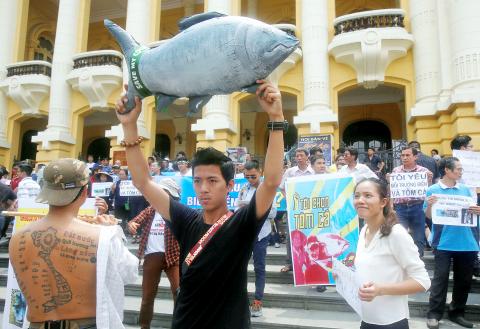Hundreds of people yesterday demonstrated in Vietnam against a Taiwanese firm they accuse of causing mass fish deaths along the nation’s central coast, with some also blaming the government for a sluggish response to a major environmental disaster.
Though an official investigation has found no links between the fish deaths and a US$10.6 billion coastal steel plant run by a unit of Taiwan’s Formosa Plastics (台塑), public anger against the company has not abated.
Hundreds gathered in Hanoi, holding banners that read: “Formosa destroying the environment is a crime” and “Who poisoned the central region’s waters?”

Photo: Reuters
Others took aim at the government for being aloof in what it described as one of its worst environmental disasters.
Demonstrations are rare in Vietnam, with uniformed and plain-clothes police usually quick to suppress them. Yesterday, they cleared traffic to allow demonstrators to do a lap of a big lake in the heart of Hanoi.
Huge numbers of dead fish have appeared at farms and on beaches since April 6, impacting 200km of coastline in four provinces, with no known cause.
Vietnamese Minister of the Environment Tran Hong Ha has demanded that Hung Nghiep Formosa Ha Tinh dig up its waste pipe at the steel project to enable the government to monitor its discharge.
The government’s initial probe said the cause could be “red tide,” when algae blooms and produces toxins, or a release of toxic chemicals by humans.
What has stoked public anger was a comment by a Formosa official, who said Vietnam had to choose between catching fish and shrimp, and building a modern steel industry.
“Here is Vietnam’s territory and there shall never be any case in which a Formosa steel plant has the right to tell the Vietnamese people to choose,” protester Cao Vinh Thinh said.
Several hundred protesters marched in Ho Chi Minh City, the economic hub, according to multiple accounts on Facebook, which is used by 30 millions Vietnamese.
State-controlled media has not reported any of the demonstrations.
Witnesses said protests also took place in central Quang Binh Province on Friday, with fishermen throwing fish on the highway after failing to sell their catch.

Vincent Wei led fellow Singaporean farmers around an empty Malaysian plot, laying out plans for a greenhouse and rows of leafy vegetables. What he pitched was not just space for crops, but a lifeline for growers struggling to make ends meet in a city-state with high prices and little vacant land. The future agriculture hub is part of a joint special economic zone launched last year by the two neighbors, expected to cost US$123 million and produce 10,000 tonnes of fresh produce annually. It is attracting Singaporean farmers with promises of cheaper land, labor and energy just over the border.

US actor Matthew McConaughey has filed recordings of his image and voice with US patent authorities to protect them from unauthorized usage by artificial intelligence (AI) platforms, a representative said earlier this week. Several video clips and audio recordings were registered by the commercial arm of the Just Keep Livin’ Foundation, a non-profit created by the Oscar-winning actor and his wife, Camila, according to the US Patent and Trademark Office database. Many artists are increasingly concerned about the uncontrolled use of their image via generative AI since the rollout of ChatGPT and other AI-powered tools. Several US states have adopted

KEEPING UP: The acquisition of a cleanroom in Taiwan would enable Micron to increase production in a market where demand continues to outpace supply, a Micron official said Micron Technology Inc has signed a letter of intent to buy a fabrication site in Taiwan from Powerchip Semiconductor Manufacturing Corp (力積電) for US$1.8 billion to expand its production of memory chips. Micron would take control of the P5 site in Miaoli County’s Tongluo Township (銅鑼) and plans to ramp up DRAM production in phases after the transaction closes in the second quarter, the company said in a statement on Saturday. The acquisition includes an existing 12 inch fab cleanroom of 27,871m2 and would further position Micron to address growing global demand for memory solutions, the company said. Micron expects the transaction to

A proposed billionaires’ tax in California has ignited a political uproar in Silicon Valley, with tech titans threatening to leave the state while California Governor Gavin Newsom of the Democratic Party maneuvers to defeat a levy that he fears would lead to an exodus of wealth. A technology mecca, California has more billionaires than any other US state — a few hundred, by some estimates. About half its personal income tax revenue, a financial backbone in the nearly US$350 billion budget, comes from the top 1 percent of earners. A large healthcare union is attempting to place a proposal before